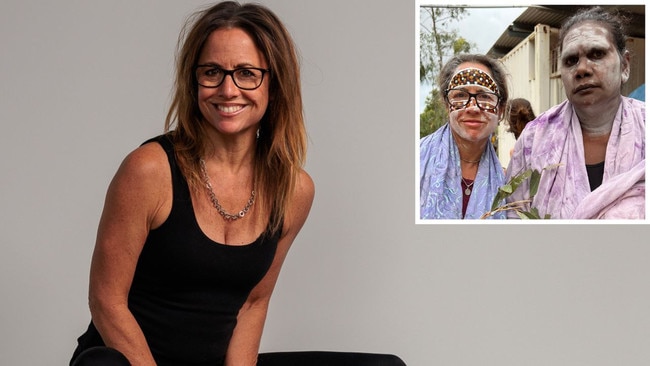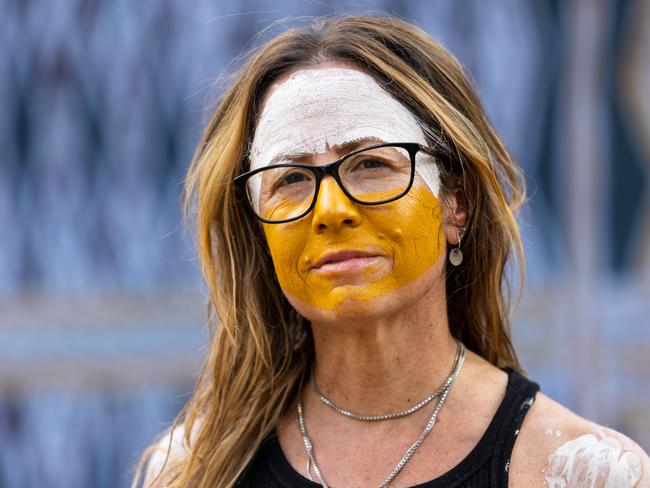New chair of the National Museum council Clare Wright supports truth-telling in Australian history
The new chair of the National Museum of Australia council, Clare Wright, took an activist position during the voice referendum last year – and she’s not sorry.

The National Museum of Australia’s new council chair, Latrobe University professor Clare Wright, took an activist position during the voice referendum last year, and she’s not sorry.
“Yes, I became an activist,” she says. “I took an active role in a political campaign that was important to me. I thought constantly during that campaign of what it would mean to my yapa (sister) and the children and grandchildren of the Yolngu people to have a voice to parliament.”
Professor Wright is not Indigenous, but she says she was “adopted” into the Yolngu in northeast Arnhem Land in 2010, by Valerie Ganambarr, who was the fourth and youngest tribal wife of a former Australian of the Year, Yunupingu.
Professor Wright was living on community at the time, with her then husband Damien Wright, who is a craftsman and furniture maker, and their three children. He had been invited to explore the possibilities of a timber mill.
“If you are on community for any length of time, essentially you need to be adopted by somebody, because you don’t make sense otherwise,” Professor Wright says.
“Once you are adopted, you are related to everybody, and suddenly everybody you speak to knows what kinship name to call you. (Valerie) said: “You call meyapa – sister. I call you yapa, and your children I call waku, and you call my children waku’.”
Professor Wright ultimately made her home back in Melbourne, but she has returned to the Yirrkala community many times over the past decade, while writing her latest book, Naku Dharuk The Bark Petitions (Text Publishing).

Professor Wright says Arts Minister Tony Burke asked her to join the museum council’s board two years ago because he “thought it was crazy that the board of the national museum” did not include a historian. Last month she became the first female chair of the council. The new director, Katherine McMahon, is also female, as are seven of the nine council members.
Professor Wright says she supports the Albanese government’s national cultural policy, First Nations First, and rejects the idea that history either can or should be neutral, saying: “It’s always going to be about who gets to write it.”
She is alive to the debate about “black armband history” which former prime minister John Howard referenced during his Sir Robert Menzies oration in 1996 (Mr Howard said he wanted to ensure “that our history as a nation is not written definitively by those who take the view that Australians should apologise for most of it”.)
Professor Wright says she is committed to “truth-telling” in history, adding: “If we don’t tell the whole story, it’s like a family pretending that everybody is doing well … nobody’s unemployed, nobody’s unwell, nobody’s divorced, nobody has jealousies and rivalries, we’re just all courageous and harmonious and perfect. Show me that family, and I’ll show you a family that is probably deeply dysfunctional and certainly in denial. It’s the same with history. We have to tell the whole story, even if it’s uncomfortable.”
Professor Wright says “history doesn’t have to be triumphalist and celebratory all the time” and she believes that the museum “has tremendous capacity to lead the way that the nation’s story is told and understood”.
“Most people probably think of a museum as a place where they go to look at dinosaurs, and kids run around and push buttons. We’ve got plenty of buttons to be pushed, but I think of a museum as a place that can shape the way a nation understands itself and its past, and therefore its future,” she says.
“Truth-telling is not always comfortable, and people are going to have to be uncomfortable. There are hard truths to swallow (but) you have to be able to talk about the things that, from time to time, are tricky, and always have been. As anyone in a marriage will know, if you are going to reconcile differences, you have to dig back over old wounds and open them up and have a proper look at them.”
As to recent history, she was dismayed by Peter Dutton’s stance on the voice (she was involved in the creation of the You’re The Voice TV commercial, featuring John Farnham’s song) saying “instead of, ‘if you don’t know, vote no’ why not say, if you don’t know, read a book, or if you don’t know, find out. If you don’t know, educate yourself, because there’s plenty (of information) out there.
“Once there was no bipartisan support, it (the voice) did not have a hope. But over six million Australians still voted yes. And that is ultimately a cause for hope.”




To join the conversation, please log in. Don't have an account? Register
Join the conversation, you are commenting as Logout